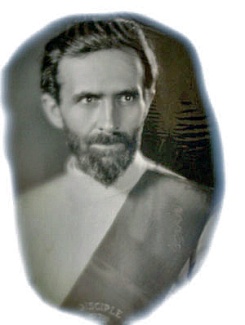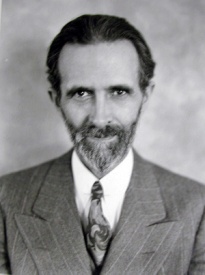The books in the Wolff Archive begin with a series “designed to bring the Philosophy of the Ancient Wisdom Religion closer to the understanding of the Western Mind.”[1] Written in the late 1920s and early 1930s, these works were published under the pseudonym “Yogagñani,” a name that Wolff adopted while associated with the Benares League of America.[2] A number of books were advertised in this series, including:

- Yoga: Its Problems, Its Purpose, Its Technique
- Re-Embodiment, or Human Incarnations
- The Elixir of Life, How to extend life in form indefinitely
- Adepts and Avatars
- Astral Light Explained
- Conditional Immortality
- Death and After
- Occult Powers Resident in Sound
- Western Science and the Ancient Wisdom
Of the titles in this list, only Yoga, Re-Embodiment, and Death and After have been found; the rest of this material does exist in outline form, and may be found under the Wolff Archive tab, Lecture Outlines.
 In addition to the works in this series, Wolff wrote two other books. The first is a journal that begins ten days after his transformative experience (or, as Wolff would have said, “imperience”) of August 7, 1936. This work documents both his outer experiences and his inner life over the following three months, and contains various philosophical reflections on what was taking place. Originally titled “From Point-I to Space-I,” it was first published in 1944 as “Pathways Through to Space.” It is a gem in the corpus of mystical literature. After this autobiographical focus, Wolff turned to the production of a work more systematically organized and designed to address philosophical questions in the academic milieu of the day. The result was his magnum opus, which is a four-part treatise titled “The Philosophy of Consciousness Without an Object” (a title that was meant to also imply “and Consciousness Without a Subject”). Wolff’s intent in this work was to restore the office of philosophy to “A Way of Realization” as opposed to simply a monitor of physical science.
In addition to the works in this series, Wolff wrote two other books. The first is a journal that begins ten days after his transformative experience (or, as Wolff would have said, “imperience”) of August 7, 1936. This work documents both his outer experiences and his inner life over the following three months, and contains various philosophical reflections on what was taking place. Originally titled “From Point-I to Space-I,” it was first published in 1944 as “Pathways Through to Space.” It is a gem in the corpus of mystical literature. After this autobiographical focus, Wolff turned to the production of a work more systematically organized and designed to address philosophical questions in the academic milieu of the day. The result was his magnum opus, which is a four-part treatise titled “The Philosophy of Consciousness Without an Object” (a title that was meant to also imply “and Consciousness Without a Subject”). Wolff’s intent in this work was to restore the office of philosophy to “A Way of Realization” as opposed to simply a monitor of physical science.
Both of these books are currently published by the State University of New York (SUNY) Press. Pathways Through to Space and the first two parts of The Philosophy of Consciousness Without an Object are combined under the title Franklin Merrell-Wolff’s Experience and Philosophy. The third and fourth parts of The Philosophy of Consciousness Without an Object have been published by SUNY under the title Transformations in Consciousness: The Metaphysics and Epistemology. The latter production, which was published a decade after Wolff’s death, has been extensively edited. This is unfortunate given that Wolff was opposed to any editing of this work, and in fact, this prospect led him to withdraw the manuscript from publication in the mid-1970s. There are unedited versions of this work available here. Also, please note that Wolff recommended reading (and wrote) Parts 1, 3, 4 of The Philosophy of Consciousness Without an Object before Part 2.
One may purchase these books (through SUNY Press) by clicking on the highlighted titles below:
Pathways Through to Space and the first two parts of The Philosophy of Consciousness Without an Object are available under the title Franklin Merrell-Wolff’s Experience and Philosophy: A Personal Record of Transformation and a Discussion of Transcendental Consciousness (Containing His Philosophy of Consciousness Without an Object and His Pathways Through to Space).
The third and fourth parts of The Philosophy of Consciousness Without an Object are offered as Transformations in Consciousness: The Metaphysics and Epistemology (Containing His Introceptualism).
Wolff began—but does not appear to have finished—at least one, and perhaps several, other books. A manuscript titled “The Four Pillared Arch” contains the first two chapters of a book in which Wolff intended to develop a “cross-understanding” between the perspectives of the East and the West. To do so, he makes use of the notions of the aesthetic continuum and the theoretic continuum, as developed by F.S.C. Northrop in the 1946 tome, The Meeting of East and West. Another manuscript is titled “The Problem of Individual Psychology”; Wolff does not state that this is part of a book, but its length (217 pages) suggests that this may have been Wolff’s intention. Since neither of these are complete works, they are not listed here, but rather, can be found under the Wolff Archive tab, “Essays.”
Endnotes
[1] Yogagñani: Re-Embodiment, or Human Incarnations (San Fernando, Calif.: Merrell-Wolff Publishing Co., 1930), 9.
[2] This organization was founded by Hari Mohan Singh, who was also known as Yogi Hari Rama; for more on Singh, see the Benares League page under the Organizations & Group Work tab. In 1928, Hari Rama appointed Wolff one of twelve “disciples” who were to carry on his teachings in America. Wolff lectured for a brief time on Super Yoga dressed—at his wife’s suggestion—in turban and robe, and under the name of “Yogagñani.”
